Curated OER
Investigation 7 - Plants In Soil
Fourth graders explain how the components of soil effect plant growth. They brainstorm different kinds of materials that plants could use for structural support. They design an experiment to show that plants can grow without soil.
Curated OER
Chemistry And The Nitrogen Cycle
Students investigate the factors that compose the nitrogen cycle. The harmful effects of acid rain and ozone depletion are also discussed in the lesson. Students define the nutrient that is often limiting to plant growth through...
Curated OER
Roots of the World
Students recognize consist stems, trunks, leaves, and roots. They compare different types of roots by observing and comparing photographs. Aterwards, they observe the growth of a lima bean plant and document changes in root and shoot...
Curated OER
COMPARE SOILS BY GROWING PLANTS
The student will identify the difference in the rate of plant growth in three soils that vary in organic matter.1. Obtain three to four flowerpots, different types of soil, a record chart, three to five beans for each pot, and water....
Curated OER
Soil In The Amazon
Students grow plants in soil representing that found in the Amazon basin. They compare results to plants growing in fertile soil and soil fertilized with leaf compost. Students chart, average and graph plant growth by height.
Students...
Curated OER
It Ain't Easy Being Green!
Students explore the needs of plants. In this science lesson plan, students plant seeds and place one in a sunny spot and the other in a dark area. Students observe what happens.
Curated OER
From One Seed Grow Many Seeds
First graders practice identifying plants by singing a song. In this plant life activity, 1st graders sing the song "Parts of a Plant" which is based on the anatomy of sunflowers. Students discover agriculture techniques...
Curated OER
Forest Friends Forever
Pupils investigate how to use the senses to gather information about objects such as size, shape, color, texture, sound, position, and change (qualitative observations are utilized throughout this lesson plan). They investigate and...
Curated OER
What is Rice?
Second graders investigate the agricultural process of rice farming by creating a rice stationary item. In this farming lesson plan, 2nd graders read about rice plants and the techniques used to harvest the edible plant....
Curated OER
Dirt Life
Students select and collect soil samples from a variety of locations (schoolyard, home, etc.). They do this lab after an interest-generating discussion about "dirt" and microbes. Students make a dilution in sterile water, plate it on a...
Curated OER
Plants Vocabulary Decoder Worksheet
In this plant vocabulary worksheet, students match the letter of the plant vocabulary word to the number next to the definition. Students complete this for 15 words.
Curated OER
Gardening for Beauty, Food, and Enjoyment
First graders create their own garden. In this plant lesson, 1st graders discover the essential elements for a plant to grow. They planted their own garden and read the amount of space needed and the sunlight preferred for each plant.
Curated OER
Hold on Tight!
Students explore the close connection between plant roots and the soil in which they grow. They investigate the roots of plants, make models of plant roots using pipe cleaners, and examine photos and images to explore the connection...
Curated OER
Let's Start Growing
Young scholars investigate how a tree grows from a seed. In this plant biology lesson, students use potting soil, tree seeds, and a paper cup to observe seeds growing into plants. Young scholars record observations in their science...
Curated OER
Flowers, Pods, and Seeds
Students gain an understanding of living organisms. the complete a plant growth data log to chart plant growth and to make observations, predictions, and personal reflections.
Curated OER
Edible Plants
Students determine what part of a plant they are eating when they eat different fruits and vegetables, and make collages of fruit and vegetable pictures that are flowers, fruits, leaves, roots, seeds, seed pods, stems and tubers.
Curated OER
Sugar and carbohydrates, protein, fat and water - that's what little plants are made of!
Students identify photosynthesis as the mechanism by which plants convert sunlight energy into a usable energy source for plant processes. They identify photosynthesis as the mechanism by which plants create a molecule that can be used...
Curated OER
Pollination
Fourth graders explore the pollination process. In this plant biology lesson, 4th graders dissect a flower to identify the parts of a flower and watch a video to see seed dispersal. Students write about the pollination process.
Curated OER
Looking for Biodiversity
Pupils explore habitats and see that there are a variety of plants that can be found and that biodiversity is an important characteristic. In this biodiversity lesson students complete an activity that explains how to perform a...
Curated OER
Rain Reasons
Students explore how climatic factors influence the growth of plants. They create an experiment to find how variations in water, light, and temperature affect plant growth and describe how precipitation and geography can affect the...
Curated OER
Great Gravity, Batman!
Eleventh graders are introduced to the effect of gravity on plant growth. They describe the major processes and mechanisms by which plants grow, develop, and supply various products, including energy and nutrition, needed by other...
Curated OER
Case of the Missing Pumpkin
Fourth graders explore holidays by participating in a pumpkin activity. In this vegetation lesson, 4th graders discuss the different uses for pumpkins, not just Halloween decorations. Students identify the nutrients pumpkins need to...
Curated OER
Plants
Student identify the characteristics of plants. Through hands-on demonstration, they create a model of plant parts. Students differentiate between the major divisions of the plant kingdom with a particular emphasis on the vascular and...
Curated OER
We Garden: My Life as a Fruit or Vegetable
Students explore agriculture by participating in a role-play activity. In this farm to fork lesson plan, students ask and answer questions as though they were a specific plant about to be eaten. Students write responses to critical...























